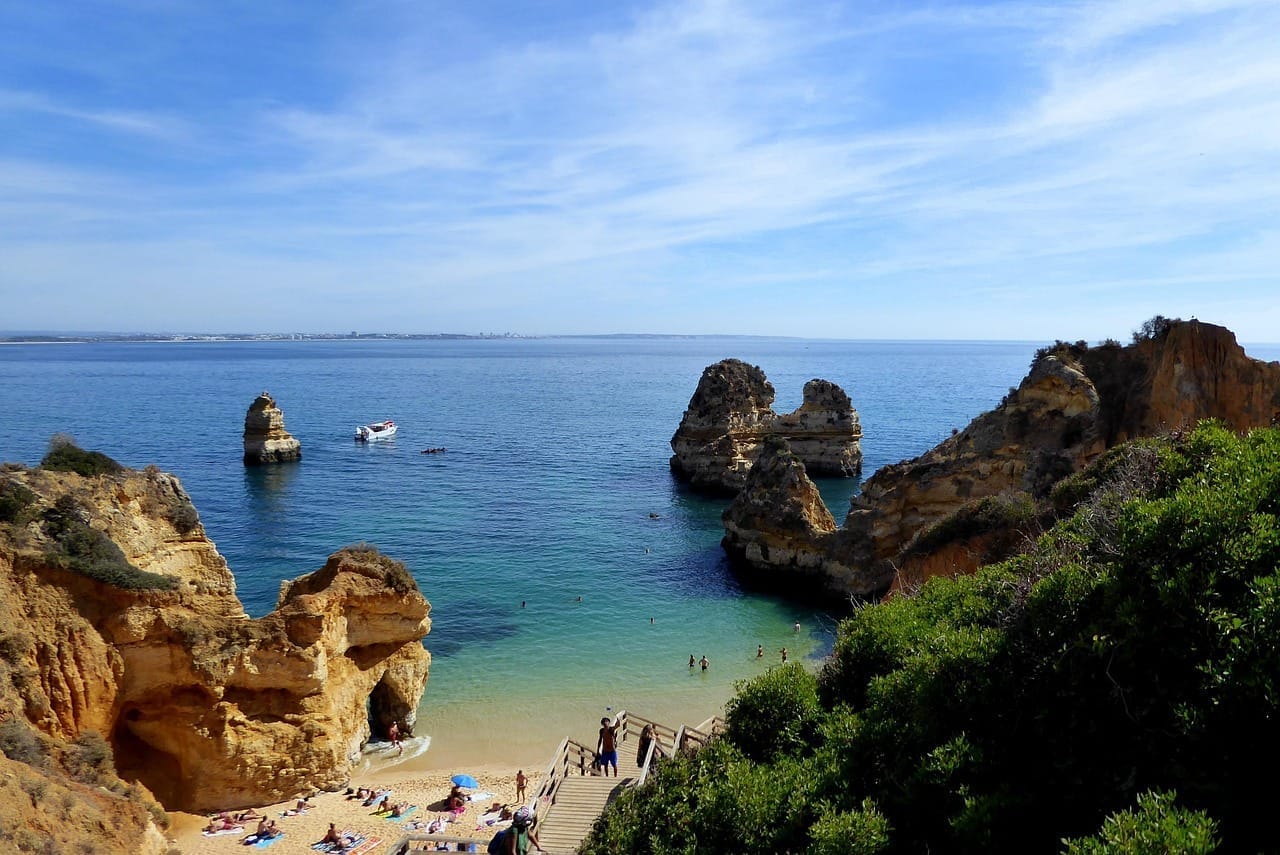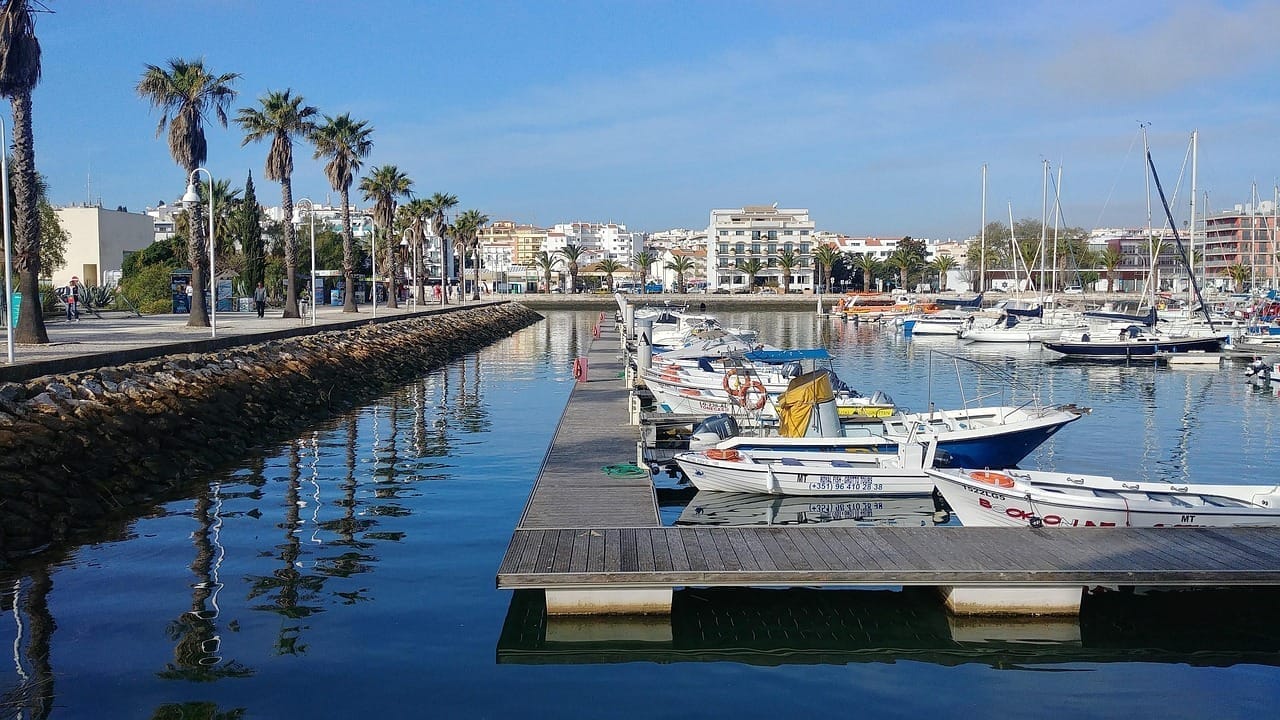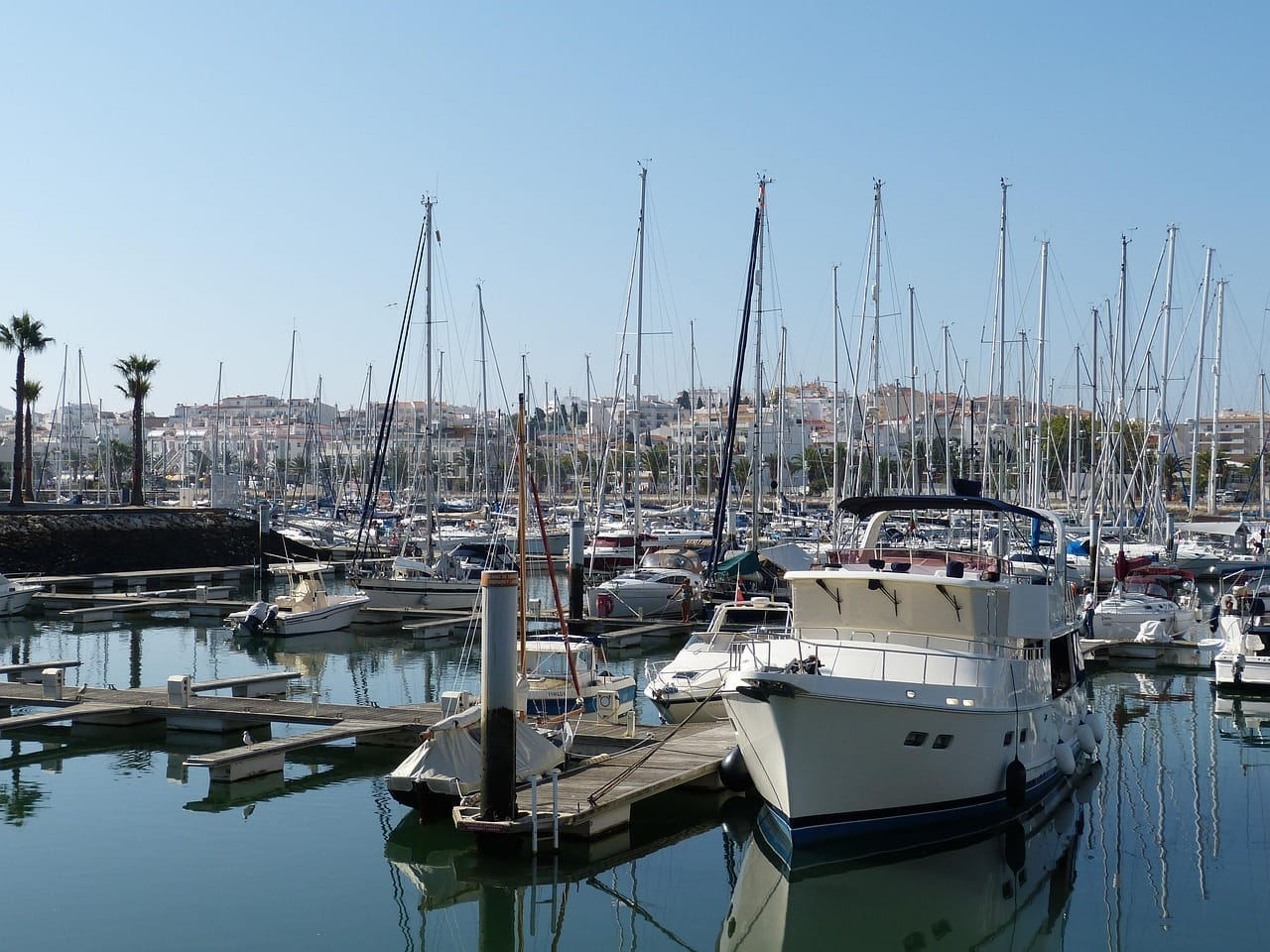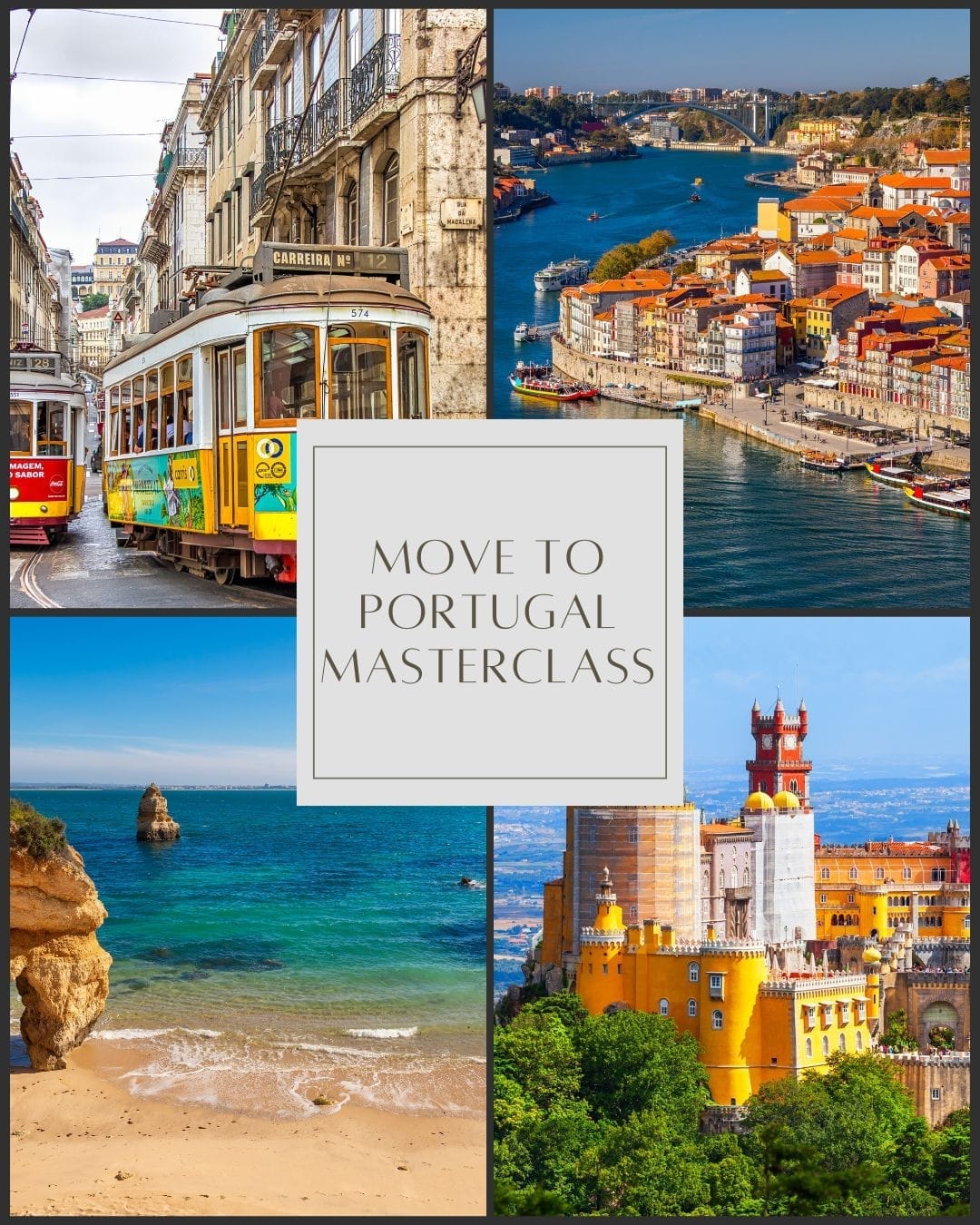
Why I Chose Lagos Over Lisbon: A Creative's Guide to Algarve Living

I'll never forget the moment I knew Lagos was home. It was early morning, and I was sitting on the clifftop at Ponta da Piedade with my laptop balanced on my knees, trying to finish a blog post before the sun got too bright. The Atlantic stretched out before me in shades of turquoise and sapphire, waves crashing against honey-colored rock formations that looked like ancient gods had sculpted them. A pod of dolphins surfaced just beyond the cliffs, their backs glistening in the golden light.
That's when I thought: How did I almost choose Lisbon over this?
Don't get me wrong, Lisbon is absolutely gorgeous. The pastel buildings, the trams rattling through cobbled streets, the vibrant creative scene... I get why so many expats fall head over heels for Portugal's capital. I almost did too. But after three years of living in Lagos, working as a travel vlogger and freelance copywriter from my sun-drenched apartment overlooking the marina, I can tell you with absolute certainty: choosing the Algarve over the capital was the best decision I've ever made.
Here's why, and why Lagos might just be your perfect Portuguese home too.
The Cost of Living: Where Your Money Actually Goes Further
Let's talk numbers first, because honestly, this was one of the biggest factors in my decision. When I was apartment-hunting in 2022, a decent one-bedroom flat in central Lisbon was running around $1,200- $1,500 USD per month. And I mean decent—nothing fancy, probably no balcony, maybe a view of another building's wall if you're lucky.
In Lagos? I rent a gorgeous two-bedroom apartment with a balcony overlooking the marina for $950 USD a month. My balcony gets afternoon sun, and I can see boats bobbing in the harbor. On quiet mornings, I hear nothing but seagulls and the gentle clinking of masts.
The space is twice as big as what I would've gotten in Lisbon for the same price.
But it's not just rent. Here's my honest monthly budget breakdown as a single creative professional in Lagos:
• Rent (2-bed with marina view): $950
• Utilities (electricity, water, internet): $85
• Groceries: $280
• Eating out (3-4 times per week): $200
• Gym membership: $35
• Transport (fuel/occasional Uber): $65
• Entertainment/coffee/drinks: $150
Total: Around $1,765 per month for a really comfortable lifestyle.
In Lisbon, just my rent and utilities alone would've eaten up what I spend on my entire life here. That extra breathing room? It's allowed me to invest in better camera equipment for my vlogs, take weekend trips to explore more of Portugal, and actually save money for the first time in years.
And here's the kicker: a gorgeous lunch of fresh grilled fish, salad, potatoes, wine, and dessert at a beachfront restaurant? That'll cost you about $18 USD in Lagos. The same meal in Lisbon's Baixa district would easily be $35-40.
The Creative Advantage: Why Lagos Is a Content Creator's Dream
As someone who makes a living creating visual content, Lagos has become my ultimate studio. Every single day, I'm surrounded by the kind of scenery that gets thousands of likes on Instagram without even trying.
The light here is everything. That famous golden hour that photographers chase? In Lagos, it lasts for what feels like hours, bathing the cliffs and beaches in warm, honey-toned light that makes everything look magical. I can shoot content for my travel vlog from 7 a.m. until sunset, capturing a wide range of moods and colors in every frame.
Lisbon is stunning, absolutely, but it's also crowded with tourists and other content creators. During peak season, you'll wait in line to get a clear shot of the famous yellow tram or the Belém Tower. In Lagos, I can drive five minutes to a different beach and have an entire cove practically to myself.
My favorite content creation spots in Lagos:
• Ponta da Piedade: Those jaw-dropping rock formations and sea caves that look straight out of a fantasy novel
• Praia do Camilo: The tiny beach accessed by wooden steps carved into the cliff
• The old town's winding cobbled streets with whitewashed buildings and colorful doors
• Lagos Marina at sunset (literally steps from my apartment)
• Meia Praia, the 4-kilometer golden sand beach that's perfect for sunrise shots
Beyond the visuals, Lagos has given me something even more valuable: inspiration. There's something about living by the ocean, waking up to sea air, and having that constant connection to nature that's completely transformed my creative work. My writing is more vivid, my videos are more authentic, and my energy is more sustainable. I'm not burning out trying to keep up with the hustle of big-city life.
Ready to make your move to Portugal?
Our comprehensive
'Move to Portugal Masterclass'
This online course covers everything you need to know—from visa applications and tax planning to finding housing and building your local network. Learn from entrepreneurs who've successfully made the transition and avoid costly mistakes.
The Lifestyle: Slow Living Meets Modern Convenience
Here's what a typical weekday looks like for me in Lagos:
I wake up around 7:30 a.m. (because let's be real, I'm not a 6 a.m. person), enjoy coffee on my balcony while watching the fishing boats head out, and either work from home or walk ten minutes to one of the co-working spaces in town. By lunchtime, I'm usually at a local café grabbing a tosta mista and a bica, chatting with the owner who now knows my order by heart.
Afternoons are for focused work: client copywriting projects, video editing, and email responses. But here's the thing: when I need a break, I can walk to the beach in five minutes. No subway ride, no traffic, no planning required. Just grab my towel and go.
Evenings? Sometimes I meet friends at a beachfront bar for sunset and petiscos (Portuguese tapas). Sometimes I cook at home with fresh fish from the market. Sometimes I drive 15 minutes to Sagres to watch the sun drop into the Atlantic at the edge of the world.
This is the kind of work-life balance I could never achieve in Dublin or even in Lisbon. Lagos has a pace that lets you actually live while you work. You're not constantly rushing, not stuck in traffic for an hour, not fighting crowds just to grab groceries.
But slow living doesn't mean sacrificing modern conveniences. Lagos has:
• Excellent fiber internet (I stream and upload large video files with zero issues)
• Multiple co-working spaces with great communities
• A hospital, English-speaking doctors, and pharmacies
• Several supermarkets, including Lidl, Continente, and Intermarché
• Great restaurants spanning Portuguese, Indian, Brazilian, Italian, and more
• An active expat community and social scene
The Community: Finding Your People
One concern I had before moving to Lagos was whether I'd feel isolated in a smaller coastal town compared to a bustling capital city. Would I find my people? Would there be enough social opportunities?
Spoiler alert: I found my community immediately, and it's more genuine than any I experienced in bigger cities.
Lagos has an incredible mix of people: Portuguese locals, long-term expats from all over Europe, digital nomads passing through, surfers, artists, entrepreneurs, and families who've relocated for a better quality of life. Because it's a smaller community, people are more open to making connections. You're not just another anonymous face in a crowd.
Within my first month, I'd joined a women's running group, started attending a weekly Portuguese language exchange at a local bar, and connected with other content creators through a co-working space. Now, three years later, my circle includes a British couple who run a yoga studio, a German photographer, a Portuguese chef who teaches me family recipes, Brazilian surfers, and fellow Irish expats who get my Tayto crisp references.
The social scene here isn't about fancy clubs or exclusive events. It's about beach bonfires, potluck dinners, spontaneous road trips to explore hidden beaches, and long conversations over wine as the sun sets over the ocean. It's real, it's warm, and it's exactly what I needed after years of surface-level city socializing.
Plus, Lagos has a thriving cultural calendar: live music at beach bars, art exhibitions, the São João festival in summer, surf competitions, and regular markets selling local crafts and produce. You're never bored, but you're also never overwhelmed.

The Nature & Outdoor Life: Your Backyard Is a Playground
If you're someone who needs access to nature to feel balanced and happy, Lagos will absolutely spoil you.
I have more than 20 beaches within a 20-minute drive. Twenty. Each one is completely different: dramatic cliffs, calm turquoise coves, long stretches of golden sand, hidden grottoes you can kayak through, surf beaches with rolling waves. Some days I want to sunbathe in a sheltered bay. Other days, I want to feel the raw power of the Atlantic crashing against rocks. I can do both.
Beyond beaches, the Algarve offers:
• Stunning clifftop walking trails with ocean views
• World-class surfing (I finally learned at age 30!)
• Kayaking, paddleboarding, and boat tours through sea caves
• Dolphin watching (they're regularly spotted off the coast)
• Cycling routes through the countryside
• Golf courses (if that's your thing—it's not mine, but they're here)
And the weather? Over 300 days of sunshine per year. Even in winter, you'll have plenty of clear, crisp days perfect for hiking or beach walks. I went swimming in the ocean in December last year. December.
Lisbon has beautiful parks and the Tagus River, sure. But it doesn't have this immediate, overwhelming access to wild, dramatic coastline. In Lagos, nature isn't something you have to seek out on weekends. It's woven into your daily life.
The Challenges: Let's Keep It Real
Okay, I'm not going to paint Lagos as some perfect paradise because that wouldn't be honest, and you deserve the whole picture.
First, Lagos is quieter than Lisbon. If you thrive on constant cultural stimulation, diverse international cuisine on every corner, big concerts, and theater productions, you might find Lagos limiting. We have culture here, but it's on a smaller scale.
Second, public transport is minimal. You really need a car to make the most of living here. I bought a used Fiat 500 for $6,500 USD, and it's been essential for grocery shopping, exploring nearby towns, and accessing different beaches. Lisbon's metro and bus system is fantastic; Lagos has local buses, but they're limited.
Third, English is widely spoken, but you'll have a much richer experience if you learn Portuguese. I'm still working on mine (it's a beautiful but challenging language!), and while I can navigate daily life in English, speaking Portuguese opens up deeper connections with locals.
Fourth, career opportunities for traditional employment are more limited than in Lisbon. If you're looking for corporate jobs or a wide range of industries, the capital makes more sense. Lagos works best for remote workers, freelancers, entrepreneurs, and people in tourism-related fields.
Finally, summer can get touristy. From June to September, Lagos fills up with visitors, beaches get crowded, and prices rise slightly. Some locals find this frustrating. I've learned to embrace it. Summer energy is fun, and I have my secret local spots I escape to when I want quiet.
These challenges are real, but for me, they're completely outweighed by everything Lagos offers. Your mileage may vary depending on your priorities.
Unlock the secrets of the world's most successful entrepreneurs with the
Global Wealth Navigator Newsletter
Discover the world's best destinations offering a lower cost of living paired with an enriched quality of life with the Global Wealth Navigator Newsletter. Whether you're a retiree or an entrepreneur, we dive into strategies that open doors to international investments, tax optimizations, and discover the finest destinations offering a superior quality of life. Don't let borders or routine define you; lets find your ideal spot in the world, regardless of your income bracket.
Year-Round Living: What Each Season Brings
One of the questions I get most often is: "But what's it like in winter?" People assume coastal towns shut down when summer ends.
Lagos doesn't.
Spring (March-May): This is magical. Wildflowers bloom along the cliffs, temperatures are perfect (18-24°C/64-75°F), and you can explore without the summer crowds. Easter week brings local festivals and processions.
Summer (June-September): Peak season. Beaches are lively, bars are buzzing, and you'll meet people from all over the world. It's hot (often 30°C/86°F+), but ocean breezes keep it bearable. Perfect for late sunsets, outdoor dinners, and beach living.
Autumn (October-November): My secret favorite. The ocean is still warm from summer, crowds have disappeared, and you get gorgeous, soft light. Surf season picks up. Local restaurants run special menus. It feels like you have the whole Algarve to yourself.
Winter (December-February): Yes, it rains more and you'll need a light jacket, but it's still mild (12-17°C/54-63°F). Many days are sunny and beautiful. I've had beach picnics in January. The town feels cozy and community-oriented. This is when you really become a local, not just a resident.
Lagos works year-round. It's not just a summer destination, it's a place where you can genuinely build a life.
The Food Scene: Fresh, Affordable, Delicious
I grew up eating fish and chips by the Irish coast, so fresh seafood is non-negotiable for me. Lagos delivers spectacularly.
The seafood here is incredible and absurdly cheap compared to what I paid in Dublin. Fresh sardines grilled over charcoal? $8 USD for a generous portion. A whole sea bass with potatoes and salad? $16 USD. Cataplana (traditional seafood stew)? $20 USD. Octopus salad that melts in your mouth? $10 USD.
The local market, Mercado Municipal, is where I shop every Saturday morning. Fishermen bring in their catch, farmers sell vegetables picked that morning, and the cheese and olive vendors know me by name. It's become one of my favorite rituals, wandering the stalls with my tote bag, chatting in broken Portuguese, and planning my meals around what looks freshest.
Beyond Portuguese cuisine, Lagos has surprisingly diverse food options: excellent Indian restaurants, authentic Brazilian churrascarias, Italian trattorias, sushi spots, and creative fusion places run by international chefs who've settled here.
My favorite food experiences:
• Dos Artistas for creative Mediterranean fusion
• Casinha do Petisco for traditional Portuguese petiscos
• Barranco for farm-to-table organic dining
• The beach bars at Meia Praia for sunset cocktails and grilled fish
• Any pastelaria for morning pastéis de nata and coffee

Making the Move: Practical Considerations
If you're seriously considering Lagos, here's what you need to know:
Visas and Residency: If you're from the EU/EEA, you can move freely. If you're from elsewhere (like I am, being Irish but needing to sort paperwork post-Brexit complexities), look into Portugal's D7 visa for passive income holders or the Digital Nomad visa. Both are relatively straightforward compared to other European countries.
Healthcare: Portugal has excellent public healthcare (SNS), and as a resident, you'll have access to it. Private health insurance is also affordable. I pay around $60 USD per month for comprehensive coverage. The local hospital in Lagos is modern and efficient, and doctors speak English.
Banking: Super easy. I opened an account with Millennium BCP within a week of arriving. You'll need a Portuguese tax number (NIF), which is simple to obtain. Additionally, Wise and Revolut are also excellent options that you can get now.
Finding Accommodation: I recommend renting first before buying. Spend a few months exploring different neighborhoods, living near the old town feels different from living by Meia Praia or Porto de Mós. Facebook groups like "Lagos Expats" and local real estate sites are your friends.
Remote Work Setup: Internet is reliable (I have 500 Mbps fiber), co-working spaces are affordable ($100-200/month for hot-desking), and coffee shops are laptop-friendly. The time zone (GMT/WET) works well for European clients and even the East Coast of the US.
For a comprehensive guide to making the move, including detailed visa information, step-by-step relocation planning, and insider tips from expats who've successfully settled in Portugal, check out our Move to Portugal Masterclass online course. It covers everything from bureaucracy to finding your community.
The Verdict: Why Lagos Wins
Look, I'm not saying Lisbon isn't wonderful. It is. If you need big-city energy, extensive career opportunities, world-class museums, and a major international airport on your doorstep, Lisbon might be your better choice.
But if you want:
• A lower cost of living with a higher quality of life
• Immediate access to stunning nature
• A genuine work-life balance
• A welcoming, authentic community
• 300+ days of sunshine and beach living
• Space to breathe, create, and actually enjoy your life
• The chance to slow down without giving up modern conveniences
Then Lagos is calling your name.
Three years ago, I made a choice that changed everything. I picked the cliffs over the cobblestones, the small-town charm over the capital buzz, the ocean sunrise over the urban skyline. And I've never looked back.
Every morning when I step onto my balcony with my coffee, watch the sun glitter across the marina, and feel that Portuguese sun on my face, I think: This is exactly where I'm meant to be.
Maybe it's where you're meant to be, too.
Ready to make your move to Portugal?
Our comprehensive
'Move to Portugal Masterclass'
This online course covers everything you need to know—from visa applications and tax planning to finding housing and building your local network. Learn from entrepreneurs who've successfully made the transition and avoid costly mistakes.
Written by Emily O’Hara
Originally from Dublin, Emily lives in the Algarve, where she works as a copywriter and travel vlogger. Her writing captures the sensory beauty of Portugal’s coast—sun, surf, and simplicity. Emily’s content blends visual storytelling with emotional connection, inspiring creative nomads to find their rhythm abroad.
📍 From Dublin, now in Lagos (Algarve)
Emily’s lively, visual storytelling brings Portugal’s coast to life—sunshine, surf, and the joy of remote creativity.
Read Articles by Emily →
Global Citizen Life
© 2023 Global Citizen Life
All rights reserved

